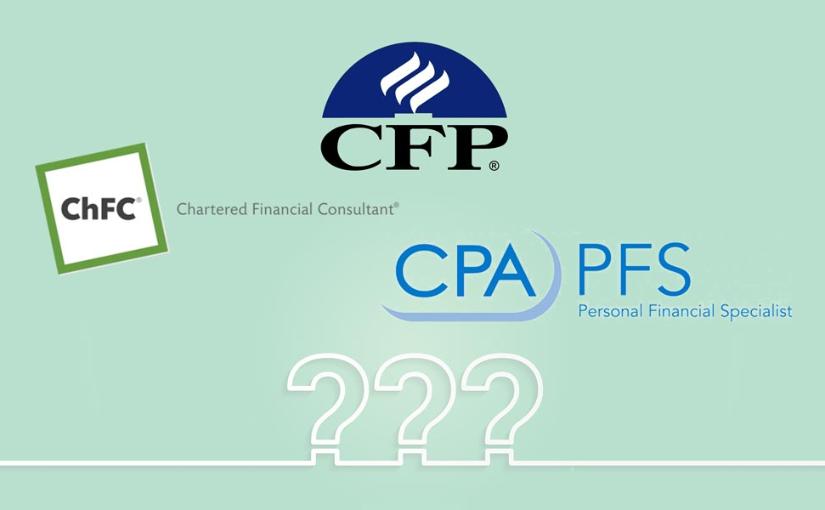You’ve decided you need a financial planner. So what do the designations of CFP, CPA/PFS and ChFC mean? What are the differences, and do they matter?
Each of these financial planning designations – the CFP (Certified Financial Planner), CPA/PFS (also known as just PFS, or Personal Financial Specialist) and ChFC (Chartered Financial Consultant) – share a common core of knowledge with similar subject matter in their coursework. They differ primarily in the path by which these designations are earned, and secondarily by the professions with which they tend to be associated (and the skills incumbent upon that profession).
In fact, they are similar enough that the governing bodies for each of these designations will recognize and credit the other toward earning their designation. For example, the AICPA (American Institute for CPAs) will not require someone with a ChFC or CFP designation to take the PFS board exam, and the American College will waive 7 of the 9 courses if you have already passed the CFP board exam.
You may see some professionals with more than one of these designations. Because these designations share a great deal in common, once you have earned one designation, the additional designations only require incremental effort (where courses or exams are waived) in comparison with earning the first designation. It’s unclear that having more than one financial planning designation offers any advantages to the client, although it may provide some marketing advantages to the professional.
Each designation will tend to be more popular with certain professionals than others. Obviously, the CPA/PFS is prominent amongst accountants because of the CPA prerequisite. The ChFC is prominent among insurance professionals because The American College, who offers the ChFC, also has a strong insurance education program. The ChFC is also a popular designation in general because it doesn’t require a bachelor’s degree, long classroom hours and lengthy board exams that both the CFP and CPA/PFS require. The CFP is more agnostic in terms of profession.
Major differences
Prerequisites
The CFP and CPA/PFS both require a Bachelor’s Degree. The CPA/PFS further requires that the candidate hold a CPA license. The ChFC does not have an education or license prerequisite.
Education
The CFP certification requires 5 courses (131 hours) from the College for Financial Planning. The CPA/PFS credential requires 6 courses (131 hours) from the American Institute of CPAs. The ChFC requires 9 courses (74 hours) from The American College.
Exam
The CFP and CPA/PFS both require a lengthy board exam (closed-book, proctored). The CFP exam is 10 hours, in 3 parts, and takes place over the course of 2 days. The CPA/PFS exam is 7 hours and 15 minutes with a 45 minute break. The ChFC does not have a board exam, and instead exams are taken as part of the 9-class curriculum, where each class requires a 2-hour, closed-book, and proctored exam.
Core Knowledge
The ChFC curriculum consists of 7 required courses and 2 electives. Executive Compensation is an elective class (optional) for the ChFC, whereas Executive Compensation is part of the core knowledge for both the CFP and CPA/PFS. If you have deferred compensation, restricted stock, fringe benefits or golden parachute payments and choose to work with a ChFC, be sure to ask if they have taken the Executive Compensation course that covers these topics and more.
Experience
Both the ChFC and CFP require 3 years of relevant experience. The CPA/PFS requires 2 years of relevant experience, keeping in mind that a CPA license and its associated experience are required before earning the PFS designation.
Background vector in the above post image was designed by Freepik

